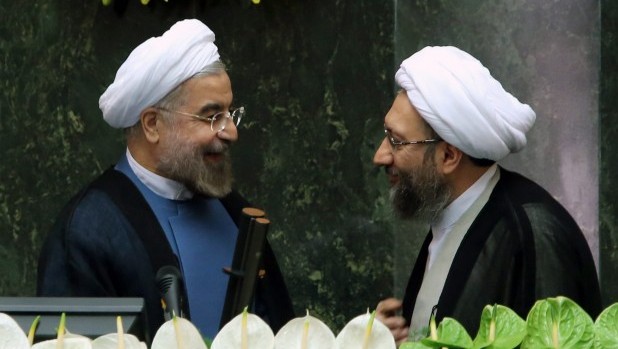
Iranian president Hassan Rouhani (L) greets judiciary chief Sadeq Larijani (R) at the Iranian parliament in Tehran, Iran, on Sunday, August 4. (EPA/ABEDIN TAHERKENAREH)
At an event attended by more than 55 foreign dignitaries, including 11 visiting presidents, Iran’s new president set out his vision and policy plan for his four-year term. Foreign dignitaries have not attended any previous inaugurations of presidents of the Islamic Republic of Iran on such scale.
Rouhani now faces the difficult task of addressing Iran’s troubled economy while finding a way to implement his foreign policy goals, which are seen as relatively conciliatory and pragmatic by outside observers.
In a clear signal to both domestic and foreign audiences that he will run the country and conduct its foreign policy markedly differently from his predecessor, President Rouhani referred to his administration as government of “wisdom and hope” at least five times during his speech before parliament.
The new Iranian president promised to respect and protect the rights of all Iranian citizens regardless of their political or ideological beliefs. In a veiled reference to his predecessor, he announced that his government will be based on ethics, honesty and truth in the hope of avoiding “illusion” and moving the country’s politics towards moderation and rationality.
Iran’s international standing was significantly diminished under former president Mahmoud Ahmadinejad, largely due to rhetoric and conduct seen as belligerent by outside observers.
Immediately after his speech, President Rouhani submitted his proposed list of Cabinet ministers to Speaker of Parliament Ali Larijani.
The most important name on that list is Mohammad Javad Zarif, who served as Iran’s representative to the UN from 2002 to 2007 and who has been tapped as Rouhani’s foreign minister. Zarif is a well-known and reputable diplomat who is widely seen as being able to skillfully communicate and negotiate with other countries while still advancing Iran’s national interests.
The predominately conservative parliament will now have to hold a vote of confidence over Rouhani’s ministers. The result of that vote will be a useful indicator of the political capital Rouhani has to implement his agenda.
It is understood that President Rouhani was in close negotiations with Ali Larijani, the powerful parliamentary speaker, before finalizing his list of ministers. As a matter of tradition, the Iranian president also consults with the supreme leader before nominating his foreign, defense and intelligence ministers. This means that Zarif’s chances of becoming the Iranian foreign minister are very high.
In a parallel development, the US government welcomed Rouhani’s inauguration, saying: “We hope the new Iranian government will heed the will of the voters by making choices that will lead to a better life for the Iranian people.”
While the US and its allies are continuing to pressure Iran over its disputed nuclear program, Rouhani’s presidency is seen to provide both sides a significant opportunity to scale back threatening rhetoric and come to the negotiating table to resolve the stand-off.
White House press secretary Jay Carney said in a statement released Sunday that Rouhani’s inauguration gives Iran a chance “to act quickly” on the nuclear issue. The White House has said that Rouhani will find the US to be “a willing partner” if the new president engages “substantively and seriously” with international concerns over Iran’s nuclear ambitions.
